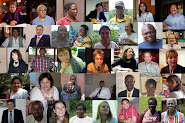 One of the organizations we’ve encountered in our effort to make leadership development more accessible in our world is the African Leadership Academy (ALA). The Academy is a new educational institution that will prepare talented 16-19 year olds from all 54 African nations to take on roles of leadership. We recently received a note from Chris Bradford of ALA spotlighting some of the incoming students. Here’s an essay from Belinda, a 16 year-old Zimbabwean girl:
One of the organizations we’ve encountered in our effort to make leadership development more accessible in our world is the African Leadership Academy (ALA). The Academy is a new educational institution that will prepare talented 16-19 year olds from all 54 African nations to take on roles of leadership. We recently received a note from Chris Bradford of ALA spotlighting some of the incoming students. Here’s an essay from Belinda, a 16 year-old Zimbabwean girl:“In June last year (2006), I noticed a certain family in our neighborhood constantly came to my house to literally beg for food. I was greatly disturbed and concerned at this behaviour. I investigated further into the issue and was saddened to discover that this family was child headed by Anna (13 years old). Anna, who was looking after her sisters (10 and 8 years), told me that her parents had died of AIDS in January (2006) and because all the money had been used up, she had resorted to asking for food in order to survive.
I was moved by her story and with the intention of helping, I asked my mother to lend me some money. With it I purchased 30 chickens at point of lay. I had calculated that if each chicken laid an egg everyday, I would have a crate to sell after school. I would sell the eggs to my neighbours and on Sundays I would take the eggs to church. With money constantly available I began to meet the orphans’ daily needs.”
ALA notes that Belinda has continued to empower Anna by teaching her how to grow vegetables in a garden. With the money from raised from the sales of the eggs and vegetables, Anna was able to support her daily needs and pay her siblings’ and her school fees.
Belinda’s approach evokes that of social entrepreneurship and speaks to the potential of young people. In his article, Everybody a Changemaker, Ashoka founder Bill Drayton, voiced the need to focus on developing young people so that they gain “applied empathy, teamwork, and leadership” skills. It was important he said that we include those who have traditionally been subject to the kind of education that leaves out inspiration and empowerment.
“The children of elite families grow up at home and usually in school being expected to take initiative and being rewarded for doing so. This confident ability to master new situations and initiate whatever changes or actions are needed is in essence what defines the elite. Entering adult life with confidence and mastery of empathy/teamwork/leadership skills is what ultimately has given this small group control of the initiative and therefore of power and resources for millennia.
However, the other 97 percent grow up getting very little such experience with taking initiative. Adults control the classroom, work setting, and even sports and extra-curricular activities. And this situation, coupled with society’s attitudes, drums home the message to this majority: “You’re not competent or perhaps even responsible. Please don’t try to start things; we can do it far better.”
Clearly young people like Belinda rise far above their circumstances, and ALA intends to enable them to hone their skills as agents of change. There is desperate need for many more institutions like ALA, however.
The gulf is great between their potential and the present state of education in places like rural India, spotlighted in a feature in the New York Times, where teachers seldom show up at decrepit schools and children learn little.
“Sixty years after independence, with 40 percent of its population under 18, India is now confronting the perils of its failure to educate its citizens, notably the poor. More Indian children are in school than ever before, but the quality of public schools like this one has sunk to spectacularly low levels, as government schools have become reserves of children at the very bottom of India’s social ladder.
Among children in fifth grade, 4 out of 10 could not read text at the second grade level, and 7 out of 10 could not subtract. The results reflected a slight improvement in reading from 2006 and a slight decline in arithmetic; together they underscored one of the most worrying gaps in India’s prospects for continued growth.
“When they get older, they’ll curse their teachers,” said Arnab Ghosh, 26, a social worker trying to help the government improve its schools, as he stared at clusters of children sitting on the grass outside. “They’ll say, ‘We came every day and we learned nothing.’ ”
In India, CCL is exploring the development of a leadership program for school principals. Helping school administrators to think creatively about their challenges is key but only a small part of what must happen. Ultimately, we need millions of schools to embark on the path that ALA has taken. It will take a lot of us working together at the global and local level to bring about this critical transformation.



















No comments:
Post a Comment